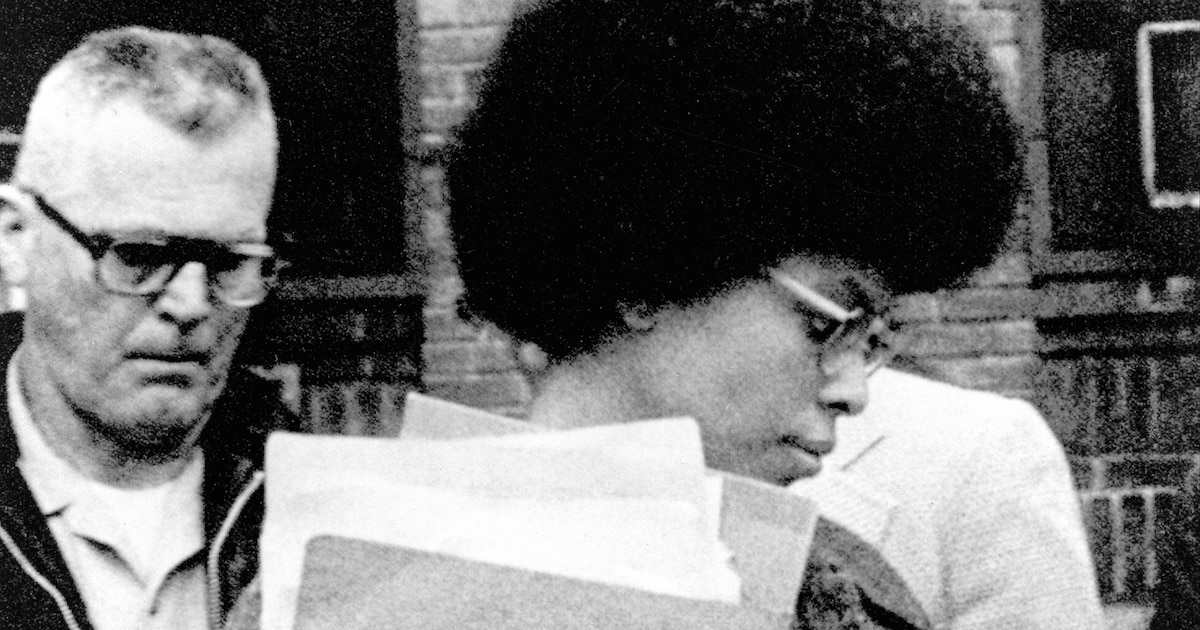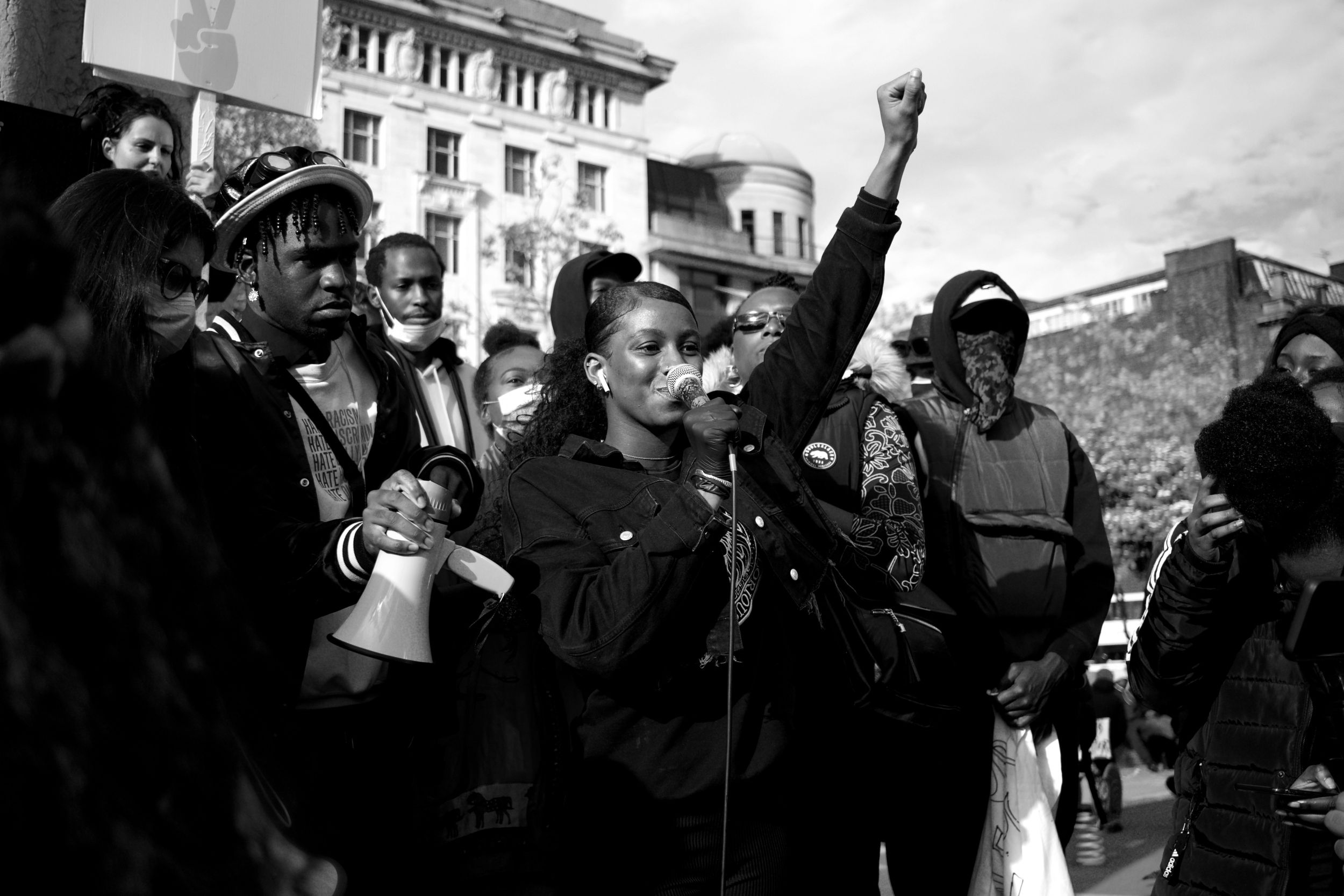By DaQuan Lawrence
AFRO International Writer
DLawrence@afro.com
Assata Olugbala Shakur, born JoAnne Deborah Byron, a political and human rights activist, former member of the Black Panther Party and a leader of the Black Liberation Army, died Sept. 25 in Havana, Cuba, at the age of 78, to Cuba’s Ministry of Foreign Affairs. Cuban authorities cited that her death was due to aging and health complications.
FILE – In this April 25, 1977, file photo, Joanne Chesimard, member of the Black Panther Party and Black Liberation Army, leaves Middlesex County courthouse in New Brunswick, N.J. Chesimard was granted asylum in Cuba after her 1979 escape from the New Jersey prison where the former Black Panther was serving a life sentence in the killing of a New Jersey state trooper. She remains there to this day. (AP Photo, File)
In 1977, Shakur was convicted by an all-White jury for the murder of a state trooper in New Jersey during a standoff with law enforcement. While serving a life sentence, the Black liberation activist escaped prison in 1979 and fled to Cuba, where she was granted political asylum by then-leader Fidel Castro.
Shakur’s resilience against political repression has served as a source of inspiration for generations and multitudes of activists, educators, researchers and many more around the world. She maintained her innocence throughout her lifetime, and her autobiography is a must-read for students of history and many people around the world.
“Words cannot describe the depth of loss that I am feeling at this time. I want to thank you for your loving prayers that continue to anchor me in the strength that I need this moment. My spirit is overflowing in unison with all of you who are grieving with me at this time,” said Shakur’s daughter, Kakuya Shakur in a Facebook post confirming her mother’s death.
Shakur was also the godmother of legendary musical artist, actor and cultural icon Tupac Shakur. Assata Shakur is known worldwide as a cultural phenom and icon herself, as her life and message continues to inspire countless human rights defenders worldwide.
Born in New York City on July 16, 1947, Shakur spent time between North Carolina and New York during the Jim Crow years., and experienced extraordinary racial discrimination, which would later propel her activism. As a college student during the 1960s, Shakur was a pivotal organizer during student rights, Black liberation, and anti-war campaigns.
“Sister Assata was the original ‘Soul sister,’ ebony, loud proud. A quiet carrier, pillar of the early Black Power movement, she fought a righteous cause,” June L. Lewis, a senior human rights defender and United Nations delegate based in London, England, told the AFRO.
Lewis continued saying Shakur’s death is “a loss to the Black warriors and freedom fighters of today. The world mourns a true inspiration to all marginalized peoples.”
FILE – A reward poster announcing the federal bounty for the capture of convicted killer Joanne Chesimard, who used the name Assata Shakur, seen in West Trenton, N.J. on Monday, May 2, 2005. (AP Photo/File)
The U.S. government sought the extradition of Shakur numerous times over the previous decades, and she has been regarded as a symbol of the strained relationship between the U.S. and Cuba. Shakur also was a polarizing figure as some U.S. agencies consider her a cop killer. In 2013, Shakur was added to the FBI’s Most Wanted Terrorists list, making her the first woman to receive this designation.
“For years, we have worked with the State Department to bring Chesimard back to New Jersey, so she could face justice for the cold-blooded murder of an American hero. Sadly, it appears she has passed without being held fully accountable for her heinous crimes,” said New Jersey Gov. Phil Murphy and State Police Superintendent Patrick Callahan in a joint statement. The pair also said they would “ vigorously oppose any attempt to repatriate Chesimard’s remains to the United States.”
For many, however, Shakur represents hope for those who fight against U.S. imperialism, capitalism and dehumanization and against injustice and oppression around the world.
Howard University professor Stacey Patton rejoiced that Shakur “died free,” in a statement on social media.
“The U.S. government, after decades of pursuit, never got the satisfaction of putting her in a cage. They wanted her bound, broken, and paraded as an example, but instead, she slipped their grip and lived out her life in exile, surrounded by people who honored her struggle and her survival,” Patton wrote.
“For racist white America, she was a fugitive. For us, she was a freedom fighter who refused to bow,” she added. “Assata leaves this world with her dignity intact, her story unbent, and her defiance ETERNAL. She was never theirs to claim. She belonged to history, to the people, and to the ongoing fight for liberation. And now, she belongs to the ancestors.”
The news of Shakur’s death in Cuba continues to reverberate around the world, as many people on social media have expressed heartbreak over the loss of the revolutionary and iconic freedom fighter, especially at this particular flashpoint in U.S. and world history with authoritarianism and divisive ideologies and policies on the rise.
“My heart is so heavy as our sheroes and heroes are dying as our enemies are gaining in power,” said Dr. Karsonya Whitehead, president of the Association for the Study of African American Life and History (ASAHL).
Whitehead, who is also the founding executive director of The Karson Institute for Race, Peace & Social Justice and a professor of communication and African and African American Studies at Loyola University Maryland, also reflected on how Shakur influenced her personally.
“From my days at Lincoln University when I first stumbled upon her work, up until today, she is what freedom looks like to me. She is what it looks like to stand up to this racist, sexist system and say ‘No, not me, not today,’” Whitehead said in her statement. “May she rest in peace and power.”
and founding executive director of The Karson Institute for Race, Peace & Social Justice and a professor of communication and African and African American Studies at Loyola University Maryland:
In a surreal point of world history, where the multipolar global community struggles to deal with disparate ideologies and shifting geopolitical agendas, Shakur’s death reminds the world that freedom is not free, however with courage and determination, valiant efforts to improve humanity remain essential as she will surely be remembered for eternity.
[SRC] https://afro.com/assata-shakur-activist-dies/
 Visit the website
Visit the website





